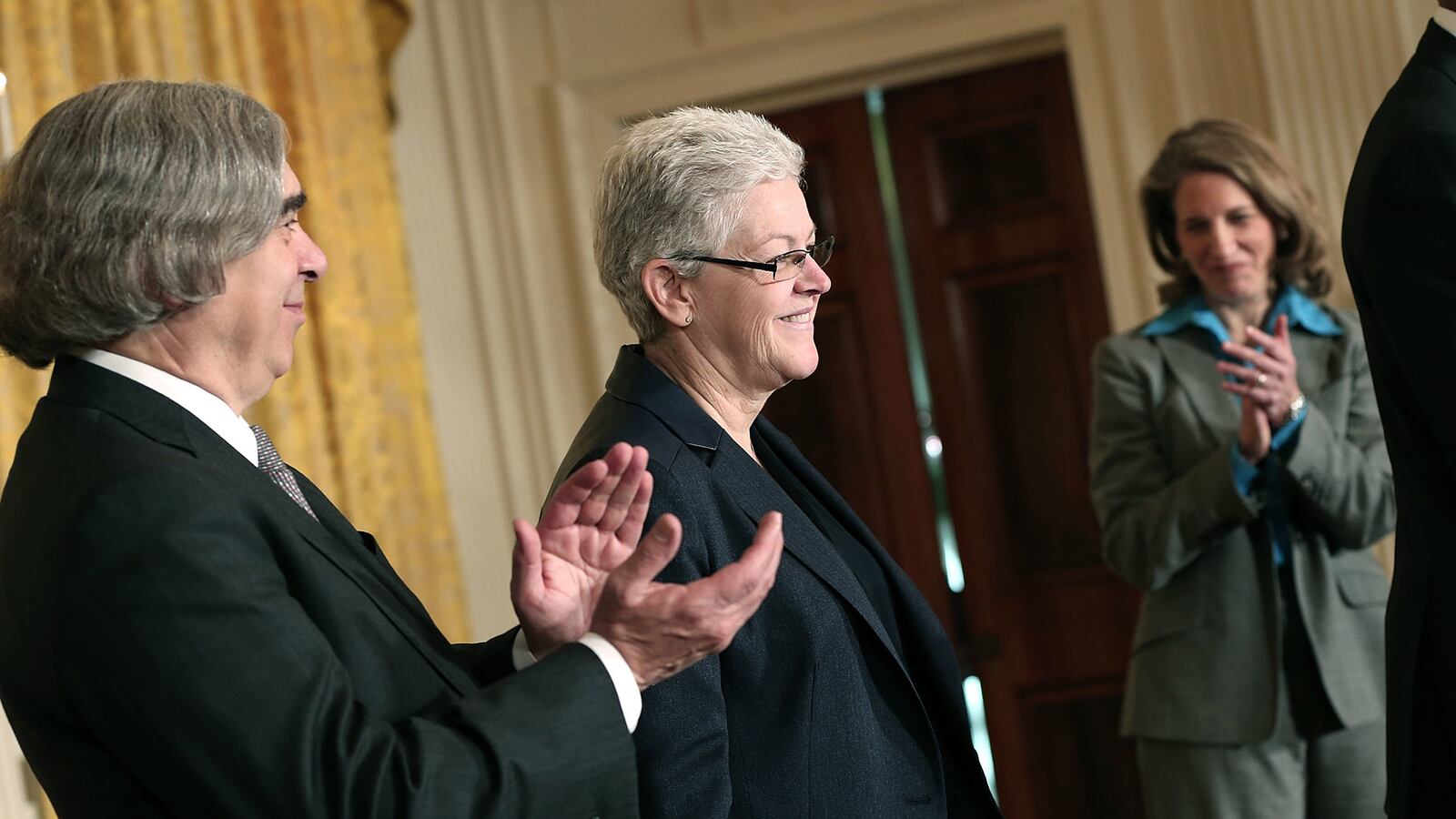First came the GOP filibuster of Chuck Hagel’s nomination as Defense secretary in February, then the slow-walk of John Brennan’s confirmation as CIA director in March. In April, Republicans put a hold on Ernest Moniz’s nomination as Energy secretary, and Wednesday brought an anonymous delay of a committee vote on Thomas Perez to become secretary of Labor.

On Thursday, the brewing battle over President Obama’s political appointees blew up into a full-fledged war after Republicans boycotted a committee vote on Gina McCarthy, Obama’s nominee for Environmental Protection Agency administrator who was once an environmental adviser to Mitt Romney.
“If Republicans think we’re going to be quiet about this, they have another thing coming,” said the chair of the Environment and Public Works Committee, Sen. Barbara Boxer, who learned of the GOP boycott 45 minutes before she planned to hold the vote.
A “stunned” Boxer sat with seven enraged Democrats to her left, eight empty Republican chairs to her right, and two votes short of the quorum she needed to conduct committee business. One of those votes belonged to the ailing Sen. Frank Lautenberg, who Boxer knew would not be a last-minute attendee.
Republicans told Boxer of the boycott in a letter, in which they complained that McCarthy had not fully answered the 1,100-plus questions they’d given her. But Boxer said Thursday they just didn’t like the answers they received.
“We just had an election. This isn’t Mr. Romney’s cabinet, this isn’t Mr. Rick Perry’s cabinet, this is Barack Obama’s cabinet, so don’t be that shocked that you may not agree with her views,” Boxer said.
Paradoxically, McCarthy might have ended up in a Romney cabinet, too; she once worked for him, and several other Republican governors, as an environmental adviser.
Those jobs, along with her easy Senate confirmation to her current EPA post as assistant administrator in 2009 and a string of endorsements from environmentalists and such unusual suspects as the CEO of Southern Company (who called her “a great pick”) and American Electric Power, had earned McCarthy a reputation as a straight shooter in Washington and made her what most Democrats thought would be a shoo-in for the EPA administrator job.
“If you’re a Republican, it would be hard to find a better EPA nominee than Gina McCarthy. She had her most senior roles in government under Republican governors,” said Daniel J. Weiss, an energy fellow with the Center for American Progress. “There’s not one scintilla of a reason to block her, unless the goal is to throw molasses in the gears of the agency.”
Molasses in the gears of a Democratic EPA could be a worthy goal for many Republicans these days. Weiss explained that without a confirmed administrator, the EPA is effectively frozen on filling lower-level personnel slots and on moving forward with policy decisions such as rules limiting carbon pollution from new power plants. “Not having an administrator makes it impossible to keep that moving,” Weiss said.
But not having a vote on McCarthy could also make keeping the U.S. Senate moving difficult. While committee Republicans went about the rest of their day, Majority Leader Harry Reid accused GOP members of “using every trick in the book” to delay Obama’s cabinet and judicial nominees. In response, Democrats threatened to change the rules of their committees, the Senate, or both, to make an end run around Republicans’ stall tactics, which Sen. Mark Udall (D–Colorado) said “are spreading like an epidemic.”
To Udall’s point, a Congressional Research Service study of recent judicial nominees found that Obama’s nominees have been blocked longer than any other administration since 1980, with Obama’s district-court nominees waiting an average of 221 days for confirmation, compared with an average of 34.7 days for Reagan’s court picks.
But while the delays have left Democrats fuming, it’s easy to see why slowing down the Obama agenda is a good day at the office for most Republicans in the Senate and an especially good day for those blocking McCarthy. Of the eight Republicans who skipped the vote, none lives in a state where Obama’s approval rating is above 41 percent. For the senators from Idaho, Nebraska, Wyoming, and Oklahoma in particular, the popularity of Obama and his policies is mired where most pollsters fear to tread—in the high 20s and mid 30s. As a Republican strategist told me, blocking an unpopular president is a popular thing to do in many states.
The question on both Democrats’ and Republicans’ minds Thursday was where the Senate will go from here. Even if McCarthy makes it out of the EPW committee, Sen. Roy Blunt (R–Missouri) has warned he already has a hold on her vote by the full Senate.
As Boxer and the Democrats licked their wounds in the EPW committee room, Republican leaders continued to stonewall Democrats on appointing members to a conference committee to hammer out a budget compromise between the House and the Senate. Meanwhile, House Republicans planned another vote to repeal Obamacare and approved a bill to pay bond holders, including the Chinese government, first if the U.S. reaches its debt limit later this year. Neither bill is expected to get a vote in the Senate.
An irate Sen. Bernie Sanders (I-Vermont) said on Thursday that at a certain point, Democrats have only themselves to blame for the breakdown in Washington—not because they are failing to get compromise but because they continue to seek it.
“We understand where our [Republican] colleagues are coming from. The question is, What are we going to do in response?” asked Sanders. “Obama won the election and we won our Senate elections. If we do not exercise majority rule, we are more to blame than they are.”





